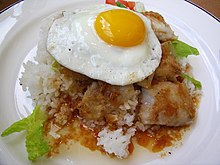Loco moco
 | |
| Course | Main course |
|---|---|
| Place of origin | United States |
| Region or state | Hawaii |
| Serving temperature | Hot |
| Main ingredients | White rice, topped with a hamburger steak, a fried sunny side egg, and brown gravy |


Loco moco is a dish featured in contemporary Hawaii cuisine. The traditional loco moco consists of white rice, topped with a hamburger patty and brown gravy, and finally a sunny-side up fried egg. These ingredients must exist in the dish to be named loco moco. No other egg variations are considered traditional and the stacking of the dish must be in the aforementioned order to be considered traditional.[1] Variations to egg style, meats, and stacking alters the naming of the dish. Modern (non-traditional) presentations of the dish may include other toppings and side dishes such as grilled onions and macaroni or potato salad.
History and origin
The dish was reportedly created at the Lincoln Grill restaurants in Hilo, Hawaii, in 1949 by its proprietors, Richard Inouye and his wife, Nancy, at the request of teenagers from the Lincoln Wreckers Sports club seeking something that differed from a sandwich, was inexpensive, and yet could be quickly prepared and served.[2] They asked Nancy to put some rice in a bowl, a hamburger patty over the rice, and then top it with brown gravy. The egg came later. The teenagers named the dish Loco Moco after one of their members, George Okimoto, whose nickname was "Crazy” because of his crazy antics. George Takahashi, who was studying Spanish at Hilo High School, suggested using Loco, which is Spanish for crazy. They tacked on "moco" which "rhymed with loco and sounded good".[3][4][5]
Popularity
This dish was featured on the "Taste of Hawai'i" episode of Girl Meets Hawai'i, a Travel Channel show hosted by Samantha Brown. The episode features the dish being served at the popular restaurant, Hawaiian Style Cafe, in Waimea together with the plate lunch, another Hawaiian specialty dish.
The loco moco was also featured on a Honolulu-based episode of the Travel Channel show Man v. Food (this episode aired in the show's second season). The host, Adam Richman, tried the dish at the Hukilau Café, located in nearby Laie. Richman also tried an off-the-menu loco moco at a San Francisco eatery called Namu Gaji on his 2014 show, Man Finds Food. In 2018, on a different episode of the revived Man v. Food, host Casey Webb tried a loaded version of the loco moco at Da Kitchen in Maui.
Variations may include bacon, ham, Spam, tofu, kalua pork, Portuguese sausage, teriyaki beef, teriyaki chicken, mahi-mahi, shrimp, oysters, and other meats. However the traditional name designation of loco moco applies to hamburger patties only. When the protein changes, the name is also changed, i.e. spam loco, kalua loco, shrimp loco etc.
See also
- Donburi
- Garbage Plate
- Hamburg steak
- List of Hawaiian dishes
- List of regional dishes of the United States
- Silog
References
- ^ "Hawaiian Family Recipe from Lincoln Grill"
- ^ Motz, George; Zimmern, Andrew; Brearton, Kristoffer; Young, Douglas (2016). The great American burger book: how to make authentic regional hamburgers at home. New York: Stewart, Tabori & Chang. ISBN 978-1-61769-182-9. OCLC 921863985.
- ^ Laudan, Rachel (1996), The Food of Paradise: Exploring Hawaii's Culinary Heritage, University of Hawaii Press, p. 20, ISBN 0824817788
- ^ "The Loco Moco - Cafe 100, Hilo Hawaii". Cafe100.com. Archived from the original on 2013-07-17. Retrieved 2013-03-26.
- ^ "Loco Moco Recipe, Loco Moco History, History and Recipe of Hawaiian Loco Moco, Hawaii's Feel Good Food, Hamburger Recipes". Whatscookingamerica.net. Retrieved 2013-03-26.
Further reading
- Gimla Shortridge, Barbara; Shortridge, James R. (1998), "The Taste of American Place: A Reader on Regional and Ethnic Foods", Geographical Review, 88 (4), Rowman & Littlefield: 604, Bibcode:1998GeoRv..88..604P, doi:10.2307/215720, ISBN 0-8476-8507-1, JSTOR 215720. A reprint of Kelly's original paper.
- Kelly, James (1983), "Loco Moco: A Folk Dish in the Making", Social Process in Hawai'i, 30: 59–64.
